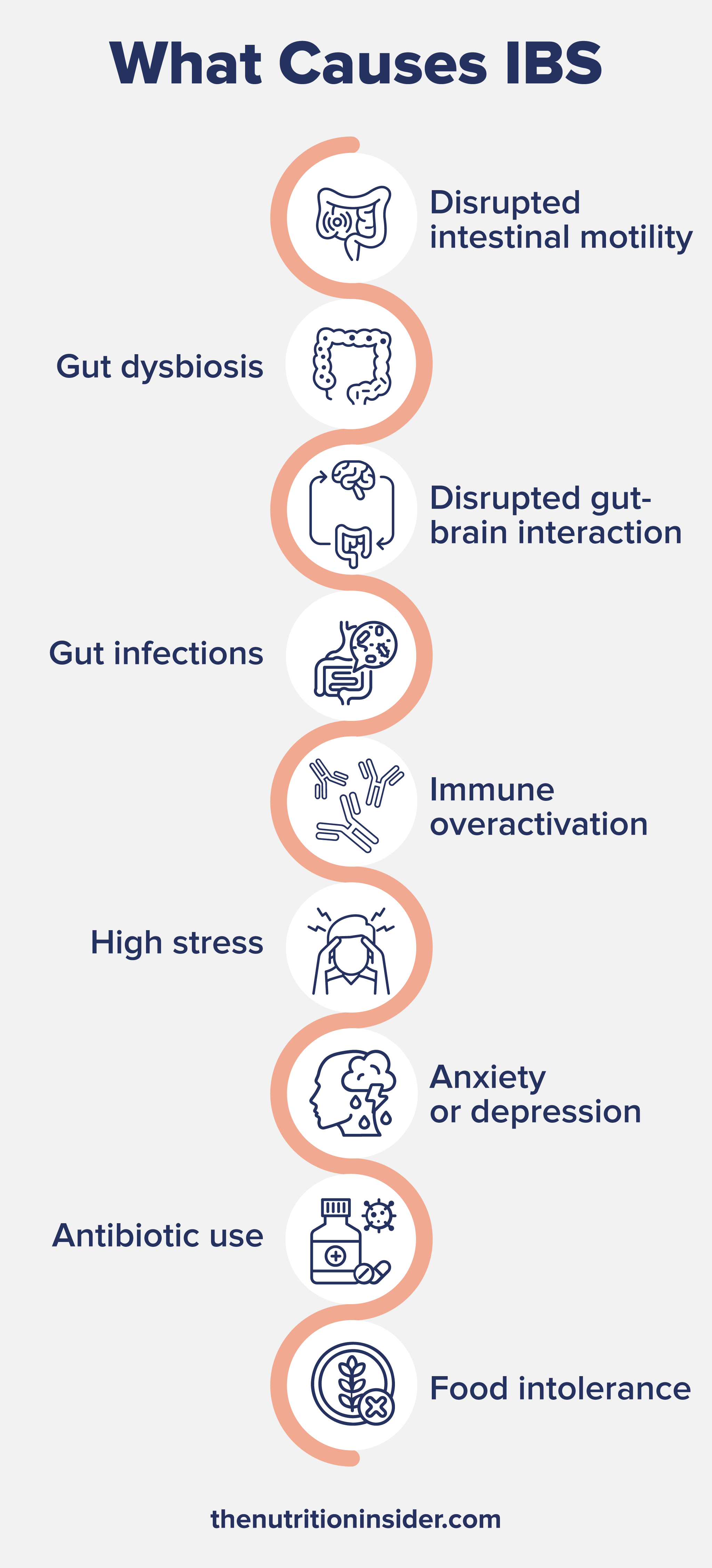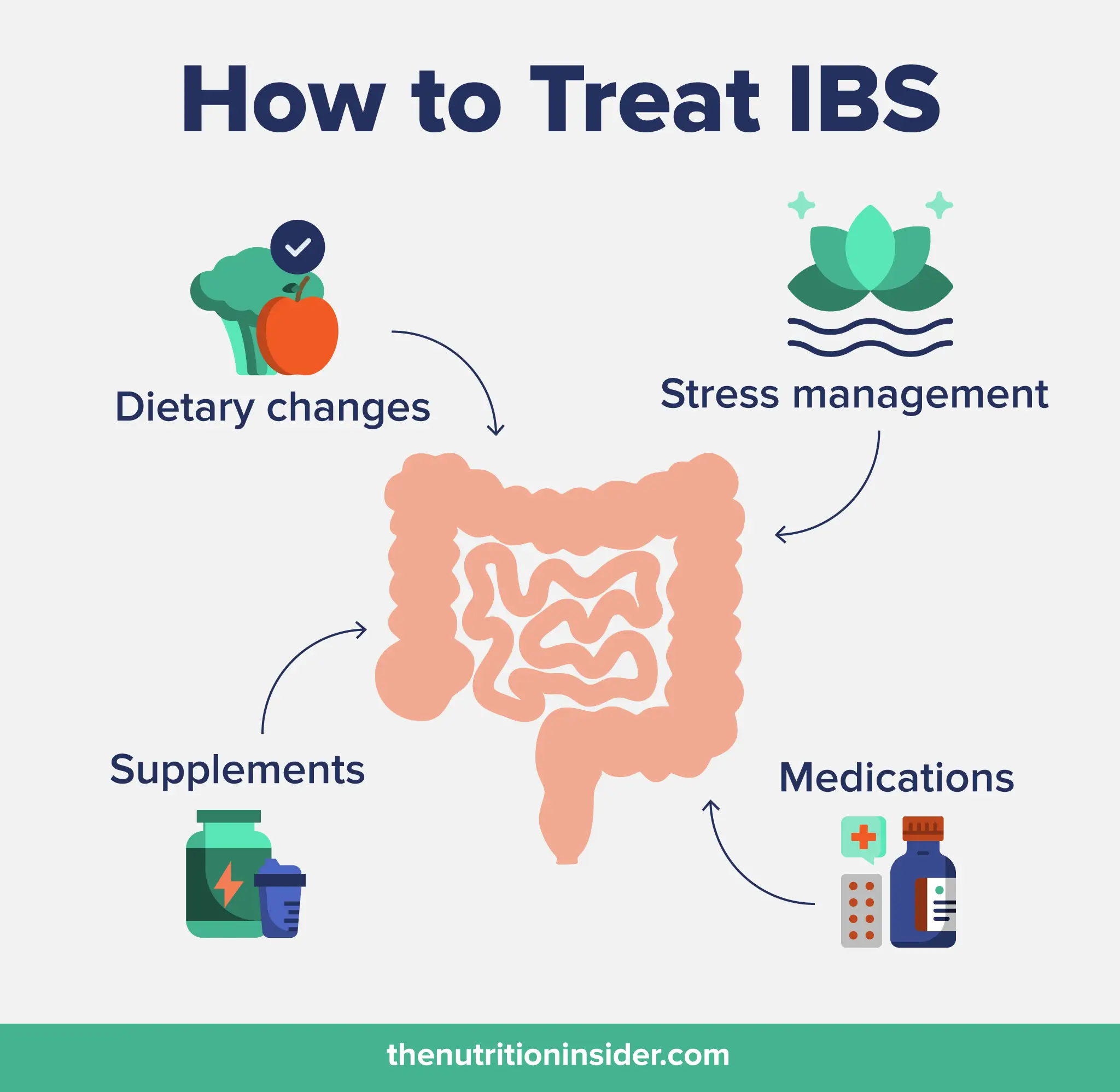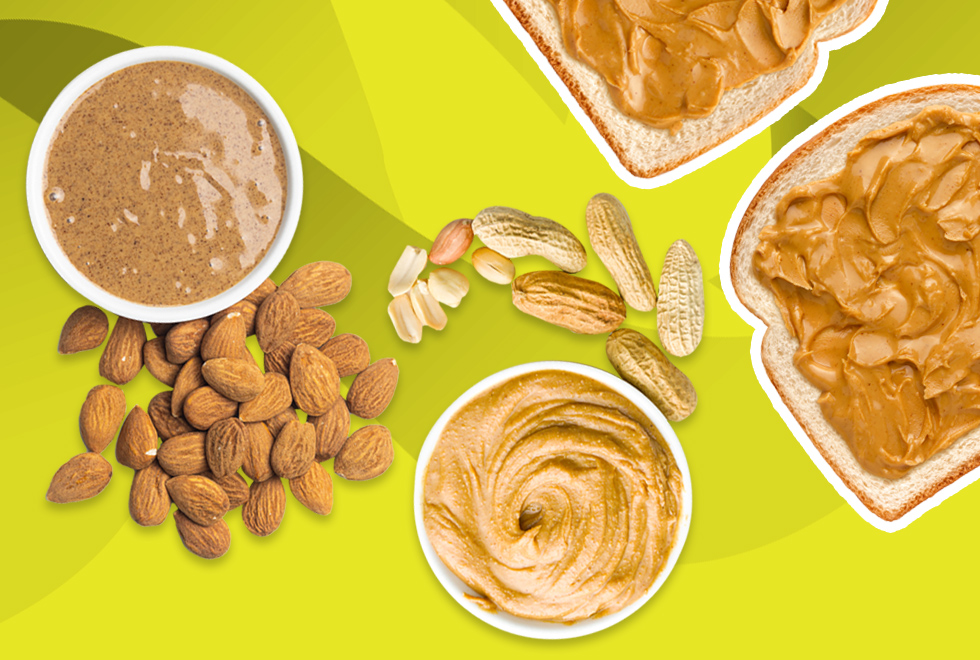This post contains links through which we may earn a small commission should you make a purchase from a brand. This in no way affects our ability to objectively critique the products and brands we review.
What Is Irritable Bowel Syndrome (IBS)?
Evidence Based Research To fulfill our commitment to bringing our audience accurate and insightful content, our expert writers and medical reviewers rely on carefully curated research.
Read Our Editorial Policy
As one of the most common digestive diseases in the United States, irritable bowel syndrome, or IBS, affects 10% to 15% of American adults.1
With symptoms including bloating or cramping after eating, gas, constipation, or diarrhea, IBS can be an uncomfortable and painful condition that can’t be cured entirely (only managed).
In this article, we’ll detail what IBS is exactly, its symptoms, suspected causes, risk factors, ways to manage it, and food triggers to consider.
What Is IBS?
Irritable bowel syndrome (IBS) is a common disorder of the digestive tract, causing uncomfortable and painful stomach and bowel symptoms.
There are three primary forms of IBS, including:
- IBS-D: Diarrhea-prominent IBS
- IBS-C: Constipation-prominent IBS
- IBS-M: A combination of the two (“mixed”)
In the United States, there is an equal distribution of these diagnoses, whereas IBS-C or IBS-M are more prevalent in Europe than IBS-D.1
Sometimes, a fourth classification is designated, which is called IBS-U (“unclassified”) for someone who doesn’t fit the criteria of the previous three.
Up to 15% of U.S. adults and 10% of adults worldwide have IBS, with women being 1.5 to 2 times more likely to have IBS than men. Women are also more likely to have IBS-C, while men more commonly report IBS-D.1
IBS is a chronic and uncurable condition with treatment based on symptom management, and everyone’s symptoms vary in severity and frequency. Although it can’t be cured, many people can control their IBS symptoms with changes to their diet and lifestyle and, potentially, medication.
Irritable Bowel Syndrome Symptoms
IBS symptoms vary widely from person to person, but the main symptoms include:
- Bloating
- Gas
- Abdominal cramping or pain
- Diarrhea (IBS-D), constipation (IBS-C), or a combination of the two (IBS-M)
- Changes in appearance or frequency of bowel movements
Less common symptoms may include:
- Mucus in your stool
- A sensation of incomplete evacuation of bowels
If you have rectal bleeding or bleeding in your stool, you should see a doctor to rule out more serious conditions, like inflammatory bowel disease or colorectal cancer. You should also see a doctor if you have more severe symptoms, unexplained weight loss, or worsening symptoms.
How Do You Diagnose IBS?
Although it was previously thought that IBS is a “catch-all diagnosis,” meaning doctors would use the term for anyone with digestive symptoms when they couldn’t find anything else wrong, there are some criteria involved in diagnosing someone with IBS.
Much of the time, the first step to diagnosing IBS is still ruling out other gastrointestinal disorders (like inflammatory bowel disease and celiac disease).
From there, the Rome IV Criteria are used to diagnose IBS, which requires recurrent abdominal pain (on average at least one day per week over the past three months) and two or more of the following symptoms:2
- Abdominal pain related to or relieved by defecation
- Change in frequency of stool
- Change in form (appearance) of stool
The IBS subtypes are then based on someone’s predominant bowel habits on the days of abnormal bowel movements. For example, IBS-C would entail at least 25% of someone’s stools being Bristol Stool Types 1 or 2, while those with IBS-D have at least 25% of their bowel movements as a Bristol 6 or 7.3
However, not everyone fits this criteria, and as there are no clinical biomarkers or blood tests, it can still be challenging to diagnose IBS.
What Causes IBS?
There is no single exact cause of IBS. Many potential causes can trigger symptoms, and someone may have many overlapping root causes that contribute to their IBS.

Some causes of IBS include:
- Disrupted intestinal motility: Problems with the movement of the intestines can cause IBS. For example, accelerated motility can cause diarrhea, while slow motility can lead to constipation.
- Gut dysbiosis: A gut microbiome with too few healthy bacteria and too many harmful bacteria is called dysbiosis, and studies show that gut dysbiosis is linked to IBS.4
- Disrupted gut-brain interaction: The gut-brain axis is a bidirectional relationship between the gastrointestinal tract and the central nervous system. Disrupted communication between them can contribute to both IBS and mental health conditions.5
- Gut infections: It’s common to develop IBS after a gut infection, including gastroenteritis, traveler’s diarrhea, or foodborne illness. This type of IBS (PI-IBS or post-infectious IBS) is the only type that is not always permanent, with about half of the cases resolving over time.6
- Immune overactivation: The gut and the immune system are tightly linked, and people with IBS tend to have immune cell overactivation in the digestive system.7
- High stress: Many people experience worsened IBS symptoms during periods of high emotional stress, and stress management or reduction can relieve symptoms.
- Anxiety or depression: It’s not entirely clear if mental health conditions cause IBS or the other way around, but it is known that people with anxiety and depression are more likely to have IBS.8
- Antibiotic use: A history of antibiotic use can disrupt the gut microbiome, contributing to dysbiosis and IBS symptoms.
- Food intolerance: Many people with IBS have food intolerances (known or unknown) that contribute to their symptoms. Research shows that up to 90% of IBS patients have symptom exacerbation linked to the consumption of a specific food.9
IBS Risk Factors
Some people are more likely to develop IBS than others. In addition to the conditions mentioned above, risk factors for IBS include:
- Being female
- Being younger (late teens to early 40s is the most common)
- Having a family history of someone with IBS
IBS and Food Triggers
Foods and beverages to avoid with IBS vary widely from person to person. Keeping a food diary can help you to pinpoint which foods or drinks cause a worsening of symptoms for you.
Some common IBS food triggers may include:
- Beans, lentils, and other legumes
- Spicy food
- Cruciferous vegetables
- Caffeine
- Dairy products
- Alcohol
- Gluten
- Fried foods
- Carbonated drinks
- Artificial sweeteners
A category of foods called FODMAPs is also a major trigger. FODMAPs (fermentable oligosaccharides, disaccharides, monosaccharides, and polyols) are sugars in certain foods that the small intestine absorbs poorly.
When FODMAP sugars ferment in the gut of someone with IBS, symptoms like gas, bloating, and cramping can occur. FODMAPs are found in high amounts in foods like garlic, onions, tomatoes, apples, wheat, beans, and more.
In a meta-analysis from 2021, researchers found that people with IBS who followed a low-FODMAP diet had reduced gastrointestinal symptoms and improved quality of life compared to those on a control diet.10
How to Treat IBS
Treatment for irritable bowel syndrome varies depending on your symptoms and suspected causes. For example, someone who has worsening symptoms from high stress and anxiety will have differing treatment and management options than someone who has IBS from eating beans.

Some of the ways to treat or manage irritable bowel syndrome symptoms include:
- Dietary changes, including avoiding your personal food triggers or going on a low-FODMAP diet
- Stress management
- Medications, such as antidiarrheals for IBS-D, laxatives for IBS-C, or antidepressants or anti-anxiety medications for people with mental health conditions
- Supplements like psyllium husk (more so for IBS-C, but IBS-D may also see benefits), probiotics, ginger, or peppermint.11
As all cases of IBS are different, it takes a lot of trial and error to see what works for you and what does not. Talk to your healthcare provider before starting new digestive supplements.
IBS FAQs
Does IBS go away?
IBS is not curable, but the symptoms can be managed with diet and lifestyle changes or, in some cases, medications.
Can you live normally with IBS?
Yes, many people with IBS can live completely normal lives. It may take dietary changes, supplements, stress reduction, and sometimes medications to do so.
What are foods to avoid if you have IBS?
Foods to avoid with IBS vary widely from person to person. Common IBS triggers include spicy food, beans, legumes, cruciferous vegetables, caffeine, dairy, alcohol, gluten, fried foods, carbonated drinks, and artificial sweeteners. A category of foods called FODMAPs is also a major trigger. FODMAPs (fermentable oligosaccharides, disaccharides, monosaccharides, and polyols) are sugars in certain foods that the small intestine absorbs poorly. When they ferment in the gut of someone with IBS, symptoms like gas, bloating, and cramping can worsen.
How do you fix irritable bowel syndrome?
Fixing or managing irritable bowel syndrome can be done with dietary changes (avoiding your personal food triggers), a low-FODMAP diet, stress management, medications (like antidiarrheals or laxatives, depending on your symptoms), and some supplements (like psyllium husk, probiotics, ginger, or peppermint). As all cases of IBS are different, it takes a lot of trial and error to see what works for you and what does not.
- Patel N, Shackelford KB. Irritable Bowel Syndrome. [Updated 2022 Oct 30]. In: StatPearls [Internet]. Treasure Island (FL): StatPearls Publishing; 2024 Jan-. Available from: https://www.ncbi.nlm.nih.gov/books/NBK534810/
- Lacy, B. E., & Patel, N. K. (2017). Rome Criteria and a Diagnostic Approach to Irritable Bowel Syndrome. Journal of Clinical Medicine, 6(11), 99. https://doi.org/10.3390/jcm6110099
- Shokouhi, N., Mohammadi, S., Ghanbari, Z., & Montazeri, A. (2022). Development of a new version of the Bristol Stool Form Scale: translation, content validity, face validity, and reliability of the Persian version. BMJ open gastroenterology, 9(1), e001017. https://doi.org/10.1136/bmjgast-2022-001017
- Napolitano, M., Fasulo, E., Ungaro, F., Massimino, L., Sinagra, E., Danese, S., & Mandarino, F. V. (2023). Gut Dysbiosis in Irritable Bowel Syndrome: A Narrative Review on Correlation with Disease Subtypes and Novel Therapeutic Implications. Microorganisms, 11(10), 2369. https://doi.org/10.3390/microorganisms11102369
- Mayer, E. A., Ryu, H. J., & Bhatt, R. R. (2023). The neurobiology of irritable bowel syndrome. Molecular psychiatry, 28(4), 1451–1465. https://doi.org/10.1038/s41380-023-01972-w
- Thabane, M., & Marshall, J. K. (2009). Post-infectious irritable bowel syndrome. World journal of gastroenterology, 15(29), 3591–3596. https://doi.org/10.3748/wjg.15.3591
- Barbara, G., Cremon, C., Carini, G., Bellacosa, L., Zecchi, L., De Giorgio, R., Corinaldesi, R., & Stanghellini, V. (2011). The immune system in irritable bowel syndrome. Journal of neurogastroenterology and motility, 17(4), 349–359. https://doi.org/10.5056/jnm.2011.17.4.349
- Midenfjord, I., Polster, A., Sjövall, H., Törnblom, H., & Simrén, M. (2019). Anxiety and depression in irritable bowel syndrome: Exploring the interaction with other symptoms and pathophysiology using multivariate analyses. Neurogastroenterology and motility, 31(8), e13619. https://doi.org/10.1111/nmo.13619
- Pasta, A., Formisano, E., Calabrese, F., Plaz Torres, M. C., Bodini, G., Marabotto, E., Pisciotta, L., Giannini, E. G., & Furnari, M. (2024). Food Intolerances, Food Allergies and IBS: Lights and Shadows. Nutrients, 16(2), 265. https://doi.org/10.3390/nu16020265
- van Lanen, A. S., de Bree, A., & Greyling, A. (2021). Efficacy of a low-FODMAP diet in adult irritable bowel syndrome: a systematic review and meta-analysis. European journal of nutrition, 60(6), 3505–3522. https://doi.org/10.1007/s00394-020-02473-0
- Alammar, N., Wang, L., Saberi, B., Nanavati, J., Holtmann, G., Shinohara, R. T., & Mullin, G. E. (2019). The impact of peppermint oil on the irritable bowel syndrome: a meta-analysis of the pooled clinical data. BMC complementary and alternative medicine, 19(1), 21. https://doi.org/10.1186/s12906-018-2409-0








